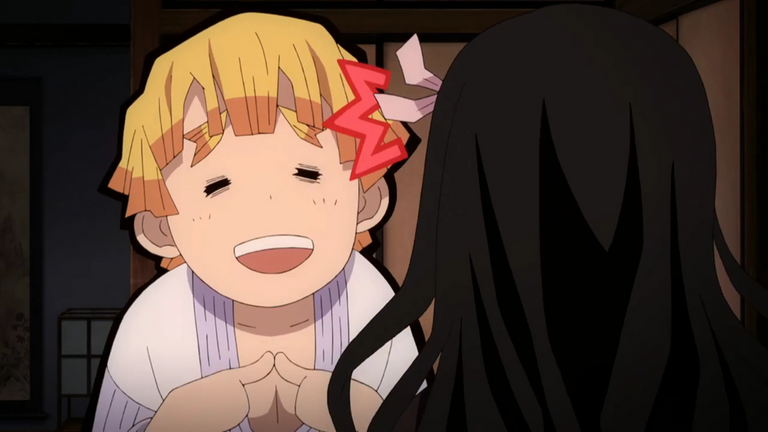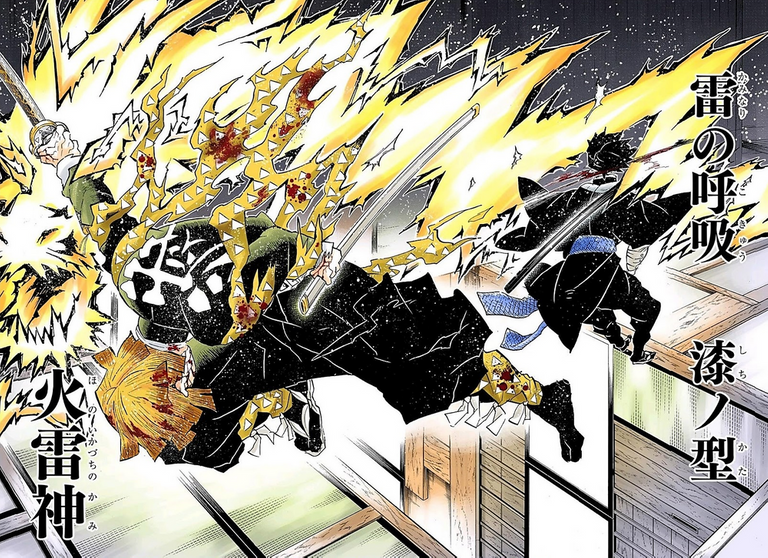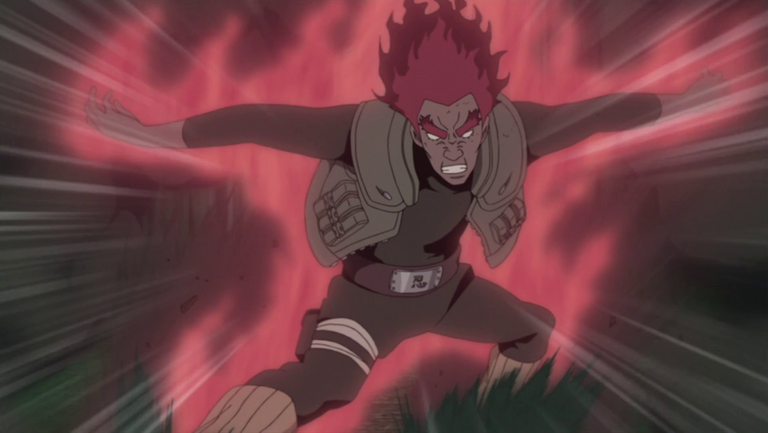[FR - ENG] Gai and Zen'itsu - The Only Path and the Lonely Summit
[ENG] Gai and Zen'itsu - The Only Path and the Lonely Summit
In the worlds of Naruto and Demon Slayer, where clashes are all about variety and multifacetedness, two characters make a bold choice: to focus on a single path, the uphill path of hyper-specialisation. This is the path of Gai Maito and Zen'itsu Agatsuma.
The ascent of Gai and Zen'itsu
I like to think of Gai and Zen'itsu as two characters on the same mountain road, a narrow strip of stone between the cliff face and a precipice. The first, a curious and optimistic man, advances serenely, tiptoeing to look further ahead. The second, on the other hand, proceeds very cautiously, hiding around corners to avoid danger. However different their approach, both are undoubtedly on the same path: a limiting path, not followed by their friends and colleagues. More difficult, certainly, but one that can offer them possibilities unknown to anyone else.

It should be noted that they are not there for the same reason: Gai by choice, Zen'itsu by obligation. The sensei chose to concentrate on martial arts and to develop a style without magic or illusory arts, on the advice of his father, who like him was less inclined to use those disciplines. Along the way, he could take advantage of any branch, any opening in the rock, to change his path, but he simply does not do so, because he feels he can only make the most of the martial arts.
Gai and Zen'itsu take the path of hyper-specialisation, making their way in worlds of variety and versatility.
It is a different matter for Zen'itsu. For him, the exits are too difficult to reach: his skills only allow him to perform the first of many lightning breathing kata. The path, whether he likes it or not, is only one, there are no other paths. But he still has a choice: he can either stay put, and remain stationary in the quagmire of self-justification, or move forward, and improve what he has, until he becomes the absolute master of it.

He would like to give up, and avoid all those dangers and fearful demons. But he also knows that it would not be right. He would not feel at peace, knowing that his indolence could cause harm to others. And he would tarnish the memory of his master, the only one who truly believed in him.
Jigoro Kuwajima: That's all right, Zen'itsu, that's all you need. Knowing how to use one is more than enough! If you can only do one thing, then refine it. To the extreme of extremes. [...] It is all right to cry, it is all right to run away, but you must not give up. You must believe. That the hellish days spent training will eventually pay off. Push yourself to the limit, and become a sword stronger than any other!
So Zen'itsu takes courage and, albeit more cautiously than Gai, begins his ascent.
The Fatigue of Gai and Zen'itsu
The path is treacherous, and bristling with obstacles. Fatigue takes its toll on your muscles, which are increasingly tired, and especially on your mind. Being limited in your range of action can be frustrating, because there will always be more disadvantages for you than for others. In this case, only confidence can help you move forward. Our two climbers know this, and that is why they surround themselves with people who believe in them, who support them on the long climb: for Gai, it is his fellow ninjas and students (of which his pupil Rock Lee in particular), while for Zen'itsu, it is the memories of the master and the friends with whom he trains and compares himself every day.
But this is often not enough. A stick, however strong, is of no use without good muscles. Confidence cannot only come from outside, you also need to believe in yourself. And in this the two differ greatly.

Perhaps because of his greater experience, perhaps because his was a choice and not an obligation, but Gai firmly believes in himself and his own abilities, and even in the face of a tough enemy, he is convinced that he can turn the tide of battle in his favour. For Zen'itsu, on the other hand, every fight is a challenge, especially an emotional one: he gives up at the first sign of a demon and faints from panic.
His self-confidence is so low that he creates an inner schism, which results in only his unconscious part fighting during sleep. Bizarre as it may be, this ploy also works well, and allows him to overcome (or rather, ignore) his insecurities. After all, when the going gets tough, one resorts to any means.
Gai and Zen'itsu take the path of hyper-specialisation, making their way in worlds of variety and versatility.
And so, the two warriors advance again, pioneers of an unexplored peak.
The Summit of Gai and Zen'itsu
What will be on the summit? The two do not know, the fog prevents them from seeing clearly. And besides, they've never even heard of anyone having made it that far, so it's not surprising. Their commitment becomes more and more substantial, but will it be a good investment? Will it be worth it once on top?
Both Gai and Zen'itsu hope so. The desire to be useful runs strong in both, to help their friends, to defend those in need, to stop the senseless atrocities that threaten their worlds. And that narrow road, which leads them to the top, finds itself to be their only chance to make a difference.

They do not even know if that peak is the highest. In fact, it is very unlikely that it is and that other paths may lead much higher. And yet, as they climb the final steps, they find themselves happy with their achievement, because, despite everything, they stuck to their principles, and never backed down. They continued despite the difficulties, climbed higher than anyone else on that path, and found a way to make themselves useful to their respective causes.
So it is not the summit that is the real meaning of this journey, but each step taken to reach it. Every choice, however small, that made them go on and improve.
The two stop looking for the summit with their eyes, they no longer need to. They continue walking, however, in the hope that that path, however impassable, can teach them something more.
[FR] Gai et Zen'itsu - Le seul chemin et le sommet solitaire
Dans les mondes de Naruto et de Demon Slayer, où les affrontements se jouent sur la variété et la multiplicité des facettes, deux personnages font un choix audacieux : se concentrer sur une seule voie, celle de l'hyperspécialisation. C'est la voie de Gai Maito et de Zen'itsu Agatsuma.
L'ascension de Gai et Zen'itsu
J'aime à considérer Gai et Zen'itsu comme deux personnages sur le même chemin de montagne, une étroite bande de pierre entre la falaise et le précipice. Le premier, curieux et optimiste, avance sereinement, sur la pointe des pieds, pour regarder plus loin. Le second, au contraire, avance très prudemment, se cachant dans les coins pour éviter le danger. Aussi différente que soit leur approche, tous deux sont indubitablement sur la même voie : une voie contraignante, que ne suivent pas leurs amis et collègues. Plus difficile, certes, mais qui peut leur offrir des possibilités inconnues de tous.

Il est à noter qu'ils ne sont pas là pour la même raison : Gai par choix, Zen'itsu par obligation. Le sensei a choisi de se concentrer sur les arts martiaux et de développer un style sans magie ni arts illusoires, sur les conseils de son père, qui comme lui était moins enclin à utiliser ces disciplines. En cours de route, il pourrait profiter de n'importe quelle branche, de n'importe quelle ouverture dans la roche, pour changer de voie, mais il ne le fait tout simplement pas, car il estime qu'il ne peut tirer le meilleur parti que des arts martiaux.
Gai et Zen'itsu empruntent la voie de l'hyperspécialisation et se frayent un chemin dans des mondes variés et polyvalents.
Il en va tout autrement pour Zen'itsu. Pour lui, les issues sont trop difficiles à atteindre : ses compétences ne lui permettent que d'exécuter le premier des nombreux kata de respiration fulgurante. Le chemin, qu'il le veuille ou non, est unique, il n'y en a pas d'autres. Mais il a encore le choix : il peut soit rester sur place, et rester immobile dans le bourbier de l'autojustification, soit aller de l'avant, et améliorer ce qu'il a, jusqu'à ce qu'il en devienne le maître absolu.

Il aimerait renoncer et éviter tous ces dangers et ces démons effrayants. Mais il sait aussi que ce ne serait pas bien. Il ne se sentirait pas en paix, sachant que son indolence pourrait causer du tort à d'autres. Et il ternirait la mémoire de son maître, le seul qui ait vraiment cru en lui.
Jigoro Kuwajima : C'est très bien, Zen'itsu, c'est tout ce dont vous avez besoin. Savoir en utiliser un est plus que suffisant ! Si vous ne pouvez faire qu'une seule chose, alors raffinez-la. Jusqu'à l'extrême des extrêmes. [...] C'est bien de pleurer, c'est bien de fuir, mais il ne faut pas abandonner. Il faut y croire. Que les jours d'enfer passés à s'entraîner finiront par payer. Repousse tes limites et deviens une épée plus forte que toutes les autres !
Zen'itsu prend donc son courage à deux mains et, bien que plus prudent que Gai, commence son ascension.
Les efforts de Gai et Zen'itsu
Le chemin est semé d'embûches et d'obstacles. La fatigue se fait sentir au niveau des muscles, qui sont de plus en plus fatigués, et surtout au niveau de l'esprit. Être limité dans son champ d'action peut être frustrant, car il y aura toujours plus d'inconvénients pour vous que pour les autres. Dans ce cas, seule la confiance peut vous aider à avancer. Nos deux grimpeurs le savent, et c'est pourquoi ils s'entourent de personnes qui croient en eux, qui les soutiennent dans cette longue ascension : pour Gai, ce sont ses camarades ninjas et ses élèves (dont son élève Rock Lee en particulier), tandis que pour Zen'itsu, ce sont les souvenirs du maître et les amis avec lesquels il s'entraîne et se compare tous les jours.
Mais cela ne suffit souvent pas. Un bâton, aussi solide soit-il, ne sert à rien s'il n'est pas bien musclé. La confiance ne vient pas seulement de l'extérieur, il faut aussi croire en soi. Et sur ce point, les deux sont très différents.

Peut-être en raison de sa plus grande expérience, peut-être parce qu'il s'agit d'un choix et non d'une obligation, mais Gai croit fermement en lui et en ses capacités, et même face à un ennemi coriace, il est convaincu qu'il peut faire basculer le cours de la bataille en sa faveur. Pour Zen'itsu, en revanche, chaque combat est un défi, surtout sur le plan émotionnel : il abandonne au premier signe d'un démon et s'évanouit de panique.
Sa confiance en lui est si faible qu'elle crée un schisme intérieur qui fait que seule sa partie inconsciente se bat pendant le sommeil. Aussi bizarre que cela puisse paraître, ce stratagème fonctionne bien et lui permet de surmonter (ou plutôt d'ignorer) ses insécurités. Après tout, dans les moments difficiles, on a recours à tous les moyens.
Gai et Zen'itsu empruntent la voie de l'hyperspécialisation et se frayent un chemin dans des mondes variés et polyvalents.
Ainsi, les deux guerriers avancent à nouveau, pionniers d'un sommet inexploré.
Le sommet de Gai et Zen'itsu
Qu'y aura-t-il au sommet ? Les deux ne le savent pas, le brouillard les empêche de voir clair. D'ailleurs, ils n'ont jamais entendu parler de quelqu'un ayant réussi à aller aussi loin, ce n'est donc pas étonnant. Leur engagement devient de plus en plus important, mais est-ce un bon investissement ? Le jeu en vaudra-t-il la chandelle une fois au sommet ?
Gai et Zen'itsu l'espèrent tous deux. Le désir d'être utile est très fort chez eux, d'aider leurs amis, de défendre ceux qui sont dans le besoin, d'arrêter les atrocités insensées qui menacent leurs mondes. Et ce chemin étroit, qui les mène au sommet, s'avère être leur seule chance de faire la différence.

Ils ne savent même pas si ce sommet est le plus élevé. En fait, il est très peu probable qu'il le soit et d'autres chemins peuvent mener beaucoup plus haut. Pourtant, alors qu'ils gravissent les dernières marches, ils sont heureux de leur accomplissement car, malgré tout, ils sont restés fidèles à leurs principes et n'ont jamais reculé. Ils ont continué malgré les difficultés, ont grimpé plus haut que quiconque sur ce chemin et ont trouvé le moyen de se rendre utiles à leurs causes respectives.
Ce n'est donc pas le sommet qui est le véritable sens de ce voyage, mais chaque étape franchie pour y parvenir. Chaque choix, aussi petit soit-il, qui leur a permis d'avancer et de s'améliorer.
Les deux hommes cessent de chercher le sommet du regard, ils n'en ont plus besoin. Ils continuent cependant à marcher, dans l'espoir que ce chemin, aussi impraticable soit-il, puisse leur apprendre quelque chose de plus.

